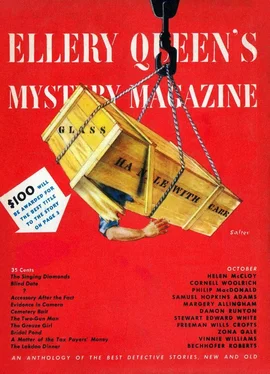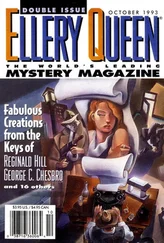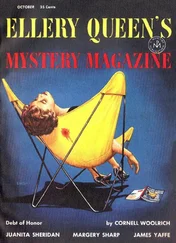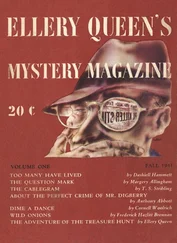Марджери Аллингем - Ellery Queen’s Mystery Magazine. Vol. 14, No. 71, October 1949
Здесь есть возможность читать онлайн «Марджери Аллингем - Ellery Queen’s Mystery Magazine. Vol. 14, No. 71, October 1949» весь текст электронной книги совершенно бесплатно (целиком полную версию без сокращений). В некоторых случаях можно слушать аудио, скачать через торрент в формате fb2 и присутствует краткое содержание. Город: New York, Год выпуска: 1949, Издательство: The American Mercury, Жанр: Классический детектив, на английском языке. Описание произведения, (предисловие) а так же отзывы посетителей доступны на портале библиотеки ЛибКат.
- Название:Ellery Queen’s Mystery Magazine. Vol. 14, No. 71, October 1949
- Автор:
- Издательство:The American Mercury
- Жанр:
- Год:1949
- Город:New York
- ISBN:нет данных
- Рейтинг книги:5 / 5. Голосов: 1
-
Избранное:Добавить в избранное
- Отзывы:
-
Ваша оценка:
- 100
- 1
- 2
- 3
- 4
- 5
Ellery Queen’s Mystery Magazine. Vol. 14, No. 71, October 1949: краткое содержание, описание и аннотация
Предлагаем к чтению аннотацию, описание, краткое содержание или предисловие (зависит от того, что написал сам автор книги «Ellery Queen’s Mystery Magazine. Vol. 14, No. 71, October 1949»). Если вы не нашли необходимую информацию о книге — напишите в комментариях, мы постараемся отыскать её.
Ellery Queen’s Mystery Magazine. Vol. 14, No. 71, October 1949 — читать онлайн бесплатно полную книгу (весь текст) целиком
Ниже представлен текст книги, разбитый по страницам. Система сохранения места последней прочитанной страницы, позволяет с удобством читать онлайн бесплатно книгу «Ellery Queen’s Mystery Magazine. Vol. 14, No. 71, October 1949», без необходимости каждый раз заново искать на чём Вы остановились. Поставьте закладку, и сможете в любой момент перейти на страницу, на которой закончили чтение.
Интервал:
Закладка:
A grin overspread Buck Johnson’s countenance. He understood.
“Climate not healthy for you?” he hazarded. “I guess you’d be safe enough all right with us. But suit yourself. The money will be here.”
“That’s agreed?” insisted the two-gun man.
“Sure.”
“I want a fresh horse — I’ll leave mine — he’s a good one. I want a little grub.”
“All right. Parker’ll fit you out.”
The stranger rose.
“I’ll see you in about ten days.”
“Good luck,” Señor Buck Johnson wished him.
The next morning Buck Johnson took a trip down into the “pasture” of five hundred wire-fenced acres.
“He means business,” he confided to Jed Parker, on his return. “That cavallo of his is a heap sight better than the Shorty horse we let him take. Jed, you found your man with nerve, all right.”
The two settled down to wait, if not with confidence, at least with interest. Sometimes, remembering the desperate character of the outlaws, their fierce distrust of any intruder, the wildness of the country, Buck Johnson and his foreman inclined to the belief that the stranger had undertaken a task beyond the powers of any one man. Again, remembering the stranger’s cool gray eye, the poise of his demeanor, the quickness of his movements, and the two guns with tied holsters to permit of easy withdrawal, they were almost persuaded that he might win.
“He’s one of those long-chance fellows,” surmised Jed. “He likes excitement. I see that by the way he takes up with my knife play. He’d rather leave his hide on the fence than stay in the corral.”
“Well, he’s all right,” replied Señor Buck Johnson, “and if he ever gets back, which same I’m some doubtful of, his dinero’ll be here waiting for him.”
In pursuance of this he rode into Willets, where shortly the overland train brought him from Tucson the five thousand dollars in double eagles.
In the meantime the regular life of the ranch went on. Each morning Sang, the Chinese cook, rang the great bell, summoning the men. They ate, and then caught up the saddle horses for the day, turning those not wanted from the corral into the pasture. Shortly they jingled away in different directions, two by two, on the slow Spanish trot of the cow-puncher. All day long thus they would ride, without food or water for man or beast, looking the range, identifying the stock, branding the young calves, examining generally into the state of affairs, gazing always with grave eyes on the magnificent, flaming, changing, beautiful, dreadful desert of the Arizona plains. At evening, when the colored atmosphere, catching the last glow, threw across the Chiricahuas its veil of mystery, they jingled in again, two by two, untired, unhasting, the glory of the desert in their deep-set, steady eyes.
And all the day long, while they were absent, the cattle, too, made their pilgrimage, straggling in singly, in pairs, in bunches, in long files, leisurely, ruminantly, without haste. There, at the long troughs filled by the windmill or the blindfolded pump mule, they drank, then filed away again into the mists of the desert. And Señor Buck Johnson, or his foreman, Parker, examined them for their condition, noting the increase, remarking the strays from another range. Later, perhaps, they, too, rode abroad. The same thing happened at nine other ranches from five to ten miles apart, where dwelt other fierce, silent men all under the authority of Buck Johnson.
And when night fell, and the topaz and violet and saffron and amethyst and mauve and lilac had faded suddenly from the Chiricahuas, like a veil that has been rent, and the ramparts had become slate-gray and then black — the soft-breathed night wandered here and there over the desert, and the land fell under an enchantment even stranger than the day’s.
So the days went by, wonderful, fashioning the ways and the characters of men. Seven passed. Buck Johnson and his foreman began to look for the stranger. Eight, they began to speculate. Nine, they doubted. On the tenth they gave him up — and he came.
They knew him first by the soft lowing of cattle. Jed Parker, dazzled by the lamp, peered out from the door, and made him out dimly, turning the animals into the corral. A moment later his pony’s hoofs impacted softly on the baked earth, he dropped from the saddle and entered the room.
“I’m late,” said he briefly, glancing at the clock, which indicated ten; “but I’m here.”
His manner was quick and sharp, almost breathless, as though he had been running.
“Your cattle are in the corral: all of them. Have you the money?”
“I have the money here,” replied Buck Johnson, laying his hand against a drawer, “and it’s ready for you when you’ve earned it. I don’t care so much for the cattle. What I wanted is the man who stole them. Did you bring him?”
“Yes, I brought him,” said the stranger. “Let’s see that money.”
Buck Johnson threw open the drawer, and drew from it the heavy canvas sack.
“It’s here. Now bring in your prisoner.”
The two-gun man seemed suddenly to loom large in the doorway. The muzzles of his revolvers covered the two before him. His speech came short and sharp.
“I told you I’d bring back the cows and the one who rustled them,” he snapped. “I’ve never lied to a man yet. Your stock is in the corral. I’ll trouble you for that five thousand. I’m the man who stole your cattle!”
Blind Date{ Copyright, 1935, by Cornell Woolrich }
by Cornell Woolrich
Larry didn’t even know his father was in the house until he met him coming down the stairs. It was a little after five and he’d just come in from the beach. “Hello Dad,” he said and held his hand out in welcome. “You didn’t tell us you were coming down from New York tonight!” Then he said: “Gee, you look white! Been working too hard?”
Larry idolized his father and worried continually about the way he kept slaving to provide for and indulge his family. Not that they weren’t comfortably well off now — but the doctor had told the elder Weeks that with that heart of his it was only a matter of months now.
Mr. Weeks didn’t answer, nor did he take his son’s outstretched hand. Instead he sat down suddenly in the middle of the staircase and hid his face behind his own hands. “Don’t go upstairs, kid!” he groaned hollowly.
Larry did just the opposite. His own face grown white in dread premonition, he leaped past his father and ran on up. He turned down the cottage’s short upper hallway and threw open the door at the end of it and looked in. It was the first room he’d come to. It was the right room.
She lay partly across the bed with her head hanging down above the floor and her light brown hair sweeping the carpet. One arm was twisted behind her back; the other one flailed out stiff and straight, reaching desperately for the help that had never come. She was his father’s wife, Larry’s stepmother. The dread he had felt on the stairs became a certainty now as he looked in. He had expected something like this sooner or later.
He turned her over, lifted her up, tried to rouse her by shaking her, by working her lower jaw back and forth with his hand. It was too late. Her eyes stared at him unblinkingly, her head rolled around like a rubber ball. Her neck had been broken. There were livid purple marks on her throat where fingers had pressed inward.
Larry let her drop back again like a rag doll, left the room and closed the door behind him. He stumbled down the hall to the head of the stairs. His father was still sitting there halfway down, his head bowed low over his knees. Larry slumped down beside him. After a while he put one hand on his father’s shoulder, then let it slip off again. “I’m with you,” he said.
Читать дальшеИнтервал:
Закладка:
Похожие книги на «Ellery Queen’s Mystery Magazine. Vol. 14, No. 71, October 1949»
Представляем Вашему вниманию похожие книги на «Ellery Queen’s Mystery Magazine. Vol. 14, No. 71, October 1949» списком для выбора. Мы отобрали схожую по названию и смыслу литературу в надежде предоставить читателям больше вариантов отыскать новые, интересные, ещё непрочитанные произведения.
Обсуждение, отзывы о книге «Ellery Queen’s Mystery Magazine. Vol. 14, No. 71, October 1949» и просто собственные мнения читателей. Оставьте ваши комментарии, напишите, что Вы думаете о произведении, его смысле или главных героях. Укажите что конкретно понравилось, а что нет, и почему Вы так считаете.












